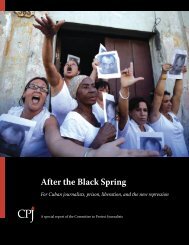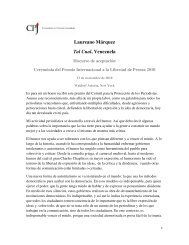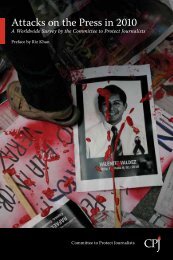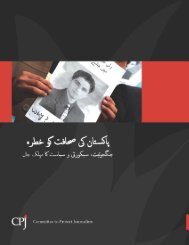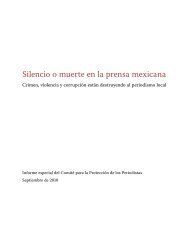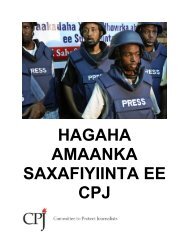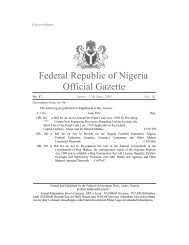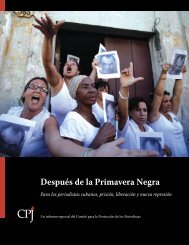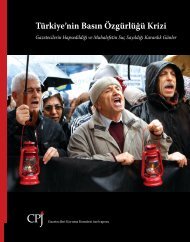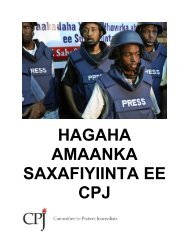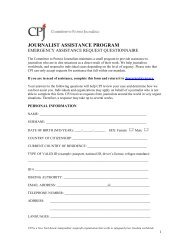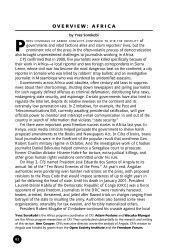Attacks on the Press - Committee to Protect Journalists
Attacks on the Press - Committee to Protect Journalists
Attacks on the Press - Committee to Protect Journalists
- No tags were found...
Create successful ePaper yourself
Turn your PDF publications into a flip-book with our unique Google optimized e-Paper software.
attacks <strong>on</strong> <strong>the</strong> press in 2009middle east and north africa: sudananisms. The Nati<strong>on</strong>al <strong>Press</strong> Council, a body with <strong>on</strong>ly nominal independencefrom <strong>the</strong> ruling party, administers manda<strong>to</strong>ry professi<strong>on</strong>al exams for journalistsand edi<strong>to</strong>rs, according <strong>to</strong> a report in <strong>the</strong> Columbia Journalism Review. Thoughseveral dozen newspapers are published locally, <strong>the</strong>y are subject <strong>to</strong> surveillanceand sancti<strong>on</strong> by <strong>the</strong> Nati<strong>on</strong>al Intelligence and Security Services (NISS). Securityagents frequently detain and harass journalists seen as critical of <strong>the</strong> ruling Nati<strong>on</strong>alC<strong>on</strong>gress Party, including those seeking <strong>to</strong> cover Darfur and internati<strong>on</strong>aljustice issues. The government also m<strong>on</strong>i<strong>to</strong>rs Internet communicati<strong>on</strong>s, includinge-mail between private citizens. Human Rights Watch c<strong>on</strong>cluded in early 2009that “<strong>the</strong> scope of informati<strong>on</strong> available <strong>to</strong> people in Sudan is more and more restrictedas discussi<strong>on</strong>s and debates about political developments or o<strong>the</strong>r mattersof significant public interest are curtailed through harsh limitati<strong>on</strong>s.”After <strong>the</strong> c<strong>on</strong>clusi<strong>on</strong> of <strong>the</strong> north-south peace agreement, journalists andoppositi<strong>on</strong> members called for new media legislati<strong>on</strong> that would allow independentpolitical coverage of nati<strong>on</strong>al electi<strong>on</strong>s. Instead, a press law passed unanimouslyby <strong>the</strong> nati<strong>on</strong>al legislature in June c<strong>on</strong>tained several restrictive measuresand failed <strong>to</strong> do away with official censorship. An earlier draft was particularlydrac<strong>on</strong>ian, granting <strong>the</strong> Nati<strong>on</strong>al <strong>Press</strong> Council authority <strong>to</strong> close newspapers,grant and revoke publicati<strong>on</strong> licenses, impose strict disciplinary measures againstjournalists, and c<strong>on</strong>fiscate printing equipment. While <strong>the</strong> final versi<strong>on</strong> includedamendments resp<strong>on</strong>ding <strong>to</strong> criticism from media advocates and oppositi<strong>on</strong> parties,it still fell far short of internati<strong>on</strong>al standards. For example, while <strong>the</strong> finalversi<strong>on</strong> prohibits <strong>the</strong> press council from shutting newspapers for more than threedays without a court decisi<strong>on</strong>, it retains a licensing system for journalists and allowsstate interference in <strong>the</strong> press <strong>on</strong> <strong>the</strong> grounds of nati<strong>on</strong>al security or publicorder. The new law also failed <strong>to</strong> overturn a 1999 Nati<strong>on</strong>al Security Forces Lawgranting security agents significant powers over <strong>the</strong> media, which in practice hasallowed <strong>the</strong>m <strong>to</strong> censor newspapers by suppressing <strong>the</strong>ir publicati<strong>on</strong> or forcing<strong>the</strong>m <strong>to</strong> remove critical s<strong>to</strong>ries.In September, al-Bashir ordered an end <strong>to</strong> prior censorship by <strong>the</strong> NISS.Previously, all local publicati<strong>on</strong>s were subject <strong>to</strong> prior review by <strong>the</strong> security service,which regularly forced edi<strong>to</strong>rs <strong>to</strong> withhold individual articles. Even sou<strong>the</strong>rnnewspapers were subject <strong>to</strong> c<strong>on</strong>trol by Khar<strong>to</strong>um, under a requirement that <strong>the</strong>yei<strong>the</strong>r be printed in <strong>the</strong> capital or outside <strong>the</strong> country, greatly increasing costs.Censorship was tightened after February 2008, when some local newspapers accused<strong>the</strong> Sudanese government of backing rebels in neighboring Chad, according<strong>to</strong> internati<strong>on</strong>al media reports.The order <strong>to</strong> end prior censorship came after local newspaper edi<strong>to</strong>rs agreed<strong>to</strong> sign a broadly worded code of c<strong>on</strong>duct. It also followed a decisi<strong>on</strong> by <strong>the</strong> SupremeCourt upholding media censorship as c<strong>on</strong>stituti<strong>on</strong>al in <strong>the</strong> interests ofnati<strong>on</strong>al security and public morality, according <strong>to</strong> <strong>the</strong> Europe-based Sudan Tribune.Many local journalists were skeptical of al-Bashir’s decisi<strong>on</strong> <strong>to</strong> ease censorship,and <strong>the</strong>y remained c<strong>on</strong>cerned that <strong>the</strong> government would impose harshpunishments <strong>on</strong> journalists seen as crossing “red lines,” <strong>the</strong> unwritten rules <strong>on</strong>what kind of journalism is acceptable. One edi<strong>to</strong>r <strong>to</strong>ld Reuters, “There is no way[security forces] are going <strong>to</strong> <strong>to</strong>lerate anything about security, about <strong>the</strong> Internati<strong>on</strong>alCriminal Court.”Before al-Bashir’s order, several egregious cases of censorship were documentedby CPJ. For example, edi<strong>to</strong>rs at <strong>the</strong> weekly Al-Maidan, operated by <strong>the</strong>oppositi<strong>on</strong> Sudanese Communist Party, declined <strong>to</strong> publish an issue in Februarybecause of extensive government interference. Security officials had forced staff<strong>to</strong> leave out nearly 20 articles, including political commentary and an opini<strong>on</strong>piece criticizing <strong>the</strong> war in Darfur, according <strong>to</strong> sources at <strong>the</strong> newspaper.Various legal provisi<strong>on</strong>s, such as harsh criminal defamati<strong>on</strong> statutes and o<strong>the</strong>rrepressive articles oft o p developments»»Government c<strong>on</strong>tinues <strong>to</strong> impose vastcensorship.»»New press law falls short of internati<strong>on</strong>alstandards.key statistic9Men executed in edi<strong>to</strong>r’s murder.Observers call it a miscarriage of justice.<strong>the</strong> penal code, allow authorities<strong>to</strong> curtail pressfreedom, while journalistsrarely have access<strong>to</strong> fair legal recourse.In July, for example, authoritiessaid female columnistAmal Habbanishould pay a fine equivalent<strong>to</strong> US$400,000 aftershe wrote an opini<strong>on</strong>piece criticizing officialprosecuti<strong>on</strong> of Lubnaal-Hussein, according <strong>to</strong> <strong>the</strong> Arabic Network for Human Rights Informati<strong>on</strong>.Habbani c<strong>on</strong>tested <strong>the</strong> claim, and <strong>the</strong> case was pending in late year. Al-Hussein,who is also a journalist, was c<strong>on</strong>victed in a Sudanese court of indecent attire forwearing pants in public, in a case that drew internati<strong>on</strong>al attenti<strong>on</strong>.In a vast country lacking in infrastructure, broadcast media were <strong>the</strong> <strong>on</strong>lymeans for most of <strong>the</strong> populati<strong>on</strong> <strong>to</strong> receive news. But Khar<strong>to</strong>um owned all localtelevisi<strong>on</strong> stati<strong>on</strong>s and c<strong>on</strong>trolled most local broadcasters, aside from radiobacked by <strong>the</strong> United Nati<strong>on</strong>s and a handful of stati<strong>on</strong>s based in South Sudan,which fall under <strong>the</strong> regula<strong>to</strong>ry authority of <strong>the</strong> semi-aut<strong>on</strong>omous government ofSouth Sudan. Sou<strong>the</strong>rn Sudanese authorities also occasi<strong>on</strong>ally harass journalistsand censor reporting. According <strong>to</strong> Human Rights Watch, draft bills are pendingbefore <strong>the</strong> Sou<strong>the</strong>rn Sudan Legislative Assembly that could help protect freedom232233




